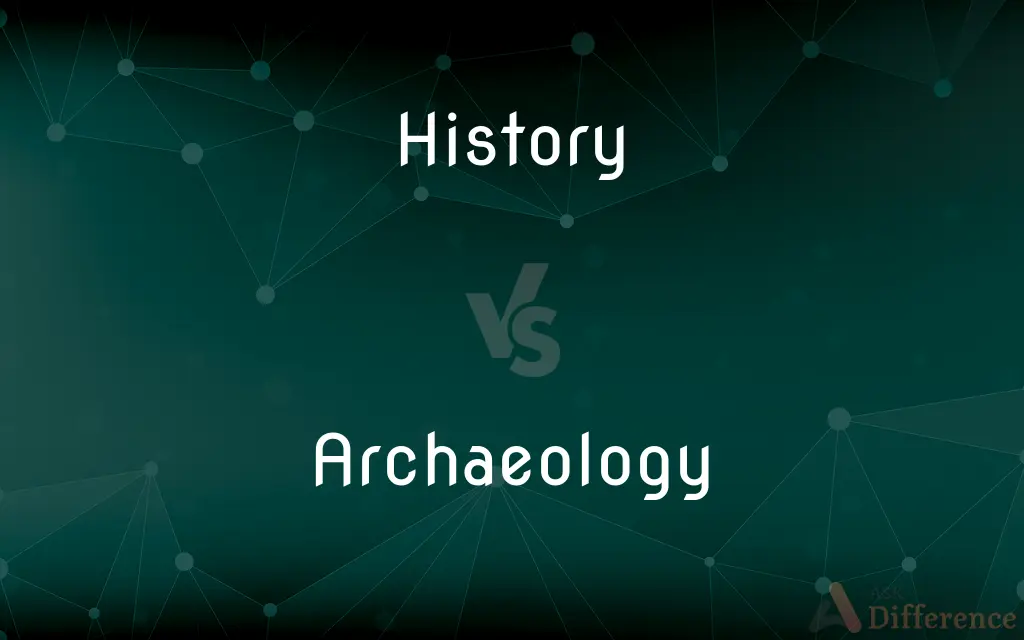History vs. Archaeology — What's the Difference?
By Tayyaba Rehman — Updated on September 30, 2023
History studies past events and human societies through written documents, while Archaeology uncovers past human life and cultures by examining material remains.

Difference Between History and Archaeology
Table of Contents
ADVERTISEMENT
Key Differences
History and Archaeology are intertwined academic disciplines, each exploring and analyzing the past from different perspectives. History primarily relies on the study of written records and documents to understand and interpret past events, societies, and civilizations. Conversely, Archaeology delves into the human past by excavating and analyzing material remains such as artifacts, structures, and ecofacts to reconstruct daily life, cultures, and societies where written records are absent or scarce.
While History predominantly involves the examination of textual evidence to piece together a coherent narrative of past events, Archaeology often requires extensive fieldwork to uncover physical evidence of past human activity. The revelations from archaeological studies complement historical narratives by providing tangible proof of human presence, activities, and advancements, allowing for a more nuanced understanding of past civilizations.
History often encompasses a broad range of topics, focusing on political events, societal structures, economic systems, and cultural developments recorded in texts. It tends to be more interpretive and analytical, scrutinizing the causality and implications of historical events. Archaeology, by contrast, adopts a more scientific approach, utilizing various methodologies and technologies to extract information from unearthed objects and sites, and reconstructing the cultures and lifestyles of ancient societies.
Through History, we gain insights into the thoughts, ideologies, and aspirations of individuals and societies as reflected in their writings, enabling us to discern the motivations and consequences of historical developments. Archaeology, meanwhile, provides a window into the mundane aspects of everyday life in antiquity, revealing patterns of human behavior, technological innovations, and environmental adaptations, even in the absence of written documentation.
In summary, History offers a lens to view the chronicles of humanity through the prism of written accounts, unfolding the tapestry of human civilization over time. Archaeology augments this tapestry by uncovering the silent remnants of the past, illuminating the unrecorded facets of human existence and evolution through meticulous analysis of material culture.
ADVERTISEMENT
Comparison Chart
Focus
Studies past through written documents
Studies past through material remains
Methodology
Analytical and interpretive
Scientific and empirical
Subject Matter
Societies, civilizations, events
Daily life, human activities, cultures
Fieldwork
Primarily research-based
Extensive, involving excavations and surveys
Outcome
Narrative of past events and societies
Reconstruction of past life and cultures
Compare with Definitions
History
The aggregate of past events related to a particular subject or place.
The history of the Renaissance marked the transition from medieval times to the modern era.
Archaeology
The study of human history and prehistory through the excavation of sites and the analysis of artifacts and other physical remains.
Archaeology helps in uncovering ancient civilizations and their way of life.
History
A branch of knowledge that analyzes, interprets, and records past events.
Learning history helps us understand the decisions and mistakes of our ancestors.
Archaeology
A field that combines elements of humanities and science to explore and interpret past civilizations.
Through archaeology, we discovered ancient artworks and inscriptions that shed light on the beliefs and values of our ancestors.
History
History (from Greek ἱστορία, historia, meaning "inquiry; knowledge acquired by investigation") is the study of the past. Events before the invention of writing systems are considered prehistory.
Archaeology
The systemic study of past human life and culture by the recovery and examination of remaining material evidence.
Archaeology enriches our knowledge of the past by studying tools, pottery, and other remnants of ancient societies.
History
A chronological record of events, as of the life or development of a people or institution, often including an explanation of or commentary on those events
A history of the Vikings.
Archaeology
The pursuit of understanding human culture by examining structures, artifacts, and other remains.
Archaeology revealed the architectural ingenuity of the Mayans through the study of their temples and cities.
History
A formal written account of related natural phenomena
A history of volcanoes.
Archaeology
Archaeology or archeology is the study of human activity through the recovery and analysis of material culture. Archaeology is often considered a branch of socio-cultural anthropology, but archaeologists also draw from biological, geological, and environmental systems through their study of the past.
History
A record of a patient's general medical background
Took the patient's history.
Archaeology
The systematic study of past human life and culture by the recovery and examination of remaining material evidence, such as graves, buildings, tools, and pottery.
History
An established condition or pattern of behavior
An inmate with a history of mental illness and drug abuse.
Archaeology
The study of the past by excavation and analysis of its material remains:
History
The branch of knowledge that records and analyzes past events
"History has a long-range perspective" (Elizabeth Gurley Flynn).
Archaeology
The actual excavation, examination, analysis and interpretation.
The building's developers have asked for some archaeology to be undertaken.
History
The past events relating to a particular thing
The history of their rivalry is full of intrigue.
Archaeology
The actual remains together with their location in the stratigraphy.
The archaeology will tell us which methods of burial were used by the Ancient Greeks.
History
The aggregate of past events or human affairs
Basic tools used throughout history.
Archaeology
The academic subject; in the USA: one of the four sub-disciplines of anthropology.
She studied archaeology at Edinburgh University.
History
An interesting past
A house with history.
Archaeology
The science or study of antiquities, esp. prehistoric antiquities, such as the remains of buildings or monuments of an early epoch, inscriptions, implements, and other relics, written manuscripts, etc.
History
Something that belongs to the past
Their troubles are history now.
Archaeology
The branch of anthropology that studies prehistoric people and their cultures
History
(Slang) One that is no longer worth consideration
Why should we worry about him? He's history!.
Archaeology
A scientific discipline concerned with the recovery and investigation of material culture from past human societies.
The field of archaeology employs advanced technologies like ground-penetrating radar to locate buried sites.
History
A drama based on historical events
The histories of Shakespeare.
History
The aggregate of past events.
History repeats itself if we don’t learn from its mistakes.
History
The branch of knowledge that studies the past; the assessment of notable events.
He teaches history at the university.
History will not look kindly on these tyrants.
He dreams of an invention that will make history.
History
The portion of the past that is known and recorded by this field of study, as opposed to all earlier and unknown times that preceded it (prehistory).
In all of human history and prehistory
In all recorded history
History
(countable) A set of events involving an entity.
What is your medical history?
The family's history includes events best forgotten.
A long and sordid history
History
(countable) A record or narrative description of past events.
I really enjoyed Shakespeare's tragedies more than his histories.
A short history of post-Columbian colonization
History
A list of past and continuing medical conditions of an individual or family.
A personal medical history is required for the insurance policy.
He has a history of cancer in his family.
This diagnosis is usually based solely on the history and physical examination, although laboratory tests are occasionally also obtained.
History
A record of previous user events, especially of visited web pages in a browser.
I visited a great site yesterday but forgot the URL. Luckily, I didn't clear my history.
History
(informal) Something that no longer exists or is no longer relevant.
I told him that if he doesn't get his act together, he's history.
History
(uncountable) Shared experience or interaction.
There is too much history between them for them to split up now.
He has had a lot of history with the police.
History
(obsolete) To narrate or record.
History
A learning or knowing by inquiry; the knowledge of facts and events, so obtained; hence, a formal statement of such information; a narrative; a description; a written record; as, the history of a patient's case; the history of a legislative bill.
History
A systematic, written account of events, particularly of those affecting a nation, institution, science, or art, and usually connected with a philosophical explanation of their causes; a true story, as distinguished from a romance; - distinguished also from annals, which relate simply the facts and events of each year, in strict chronological order; from biography, which is the record of an individual's life; and from memoir, which is history composed from personal experience, observation, and memory.
Histories are as perfect as the historian is wise, and is gifted with an eye and a soul.
For aught that I could ever read,Could ever hear by tale or history.
What histories of toil could I declare!
Justly Cæsar scorns the poet's lays;It is to history he trusts for praise.
No more yet of this;For 't is a chronicle of day by day,Not a relation for a breakfast.
Many glorious examples in the annals of our religion.
History
To narrate or record.
History
The aggregate of past events;
A critical time in the school's history
History
The continuum of events occurring in succession leading from the past to the present and even into the future;
All of human history
History
A record or narrative description of past events;
A history of France
He gave an inaccurate account of the plot to kill the president
The story of exposure to lead
History
The discipline that records and interprets past events involving human beings;
He teaches Medieval history
History takes the long view
History
All that is remembered of the past as preserved in writing; a body of knowledge;
The dawn of recorded history
From the beginning of history
History
The study of past events, particularly in human affairs.
The history of ancient Greece is studied to understand its influence on western civilization.
History
The chronological record of significant events often including an explanation of their causes.
The Revolutionary War holds paramount importance in American history.
History
The continuous, systematic narrative of past events as relating to a particular people, country, period, person, etc.
The history of the Roman Empire provides insight into governance, warfare, and society of that era.
Common Curiosities
Does archaeology only study ancient civilizations?
No, archaeology studies all periods, from ancient to recent past, including the study of modern societies.
Is archaeology a branch of anthropology?
Yes, archaeology is often considered a subfield of anthropology, studying past cultures through material remains.
Is history solely based on written records?
Primarily, but it also incorporates other sources like oral traditions where written records are unavailable.
Can history provide insights into cultural development?
Yes, history analyzes cultural developments, ideologies, and societal norms of different civilizations.
Does history primarily focus on political events?
While political events are significant, history also studies economic, social, cultural, and intellectual developments.
Can archaeology reveal information about extinct species?
Yes, paleoarchaeology specifically studies extinct species and their interaction with early humans.
Is the study of history objective?
History aims for objectivity, but interpretations and emphasis can vary depending on the historian's perspective.
Share Your Discovery

Previous Comparison
Linotype vs. Monotype
Next Comparison
Ah vs. OhAuthor Spotlight
Written by
Tayyaba RehmanTayyaba Rehman is a distinguished writer, currently serving as a primary contributor to askdifference.com. As a researcher in semantics and etymology, Tayyaba's passion for the complexity of languages and their distinctions has found a perfect home on the platform. Tayyaba delves into the intricacies of language, distinguishing between commonly confused words and phrases, thereby providing clarity for readers worldwide.
















































